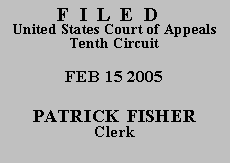

| SHELIA D. HUDSON, |
|
| v. | |
| RICHARD KOERNER; ATTORNEY GENERAL OF THE STATE OF KANSAS, |
Applicant then filed with this court what she captioned a "Petition for Relief from Judgment or Order Pursuant to Rule 60(b) Fed. R. Civil Procedure and De Novo Review of the Instant Matter." We referred the petition to the district court for consideration. That court, construing it as a second habeas petition under the Antiterrorism and Effective Death Penalty Act of 1996, transferred it back to us because such a petition may not be filed in district court absent an authorizing order from this court. See 28 U.S.C. § 2244(b)(3)(A). Disagreeing with the district court's characterization, we remanded the petition to the district court for reconsideration as a § 2241 claim.
On remand the district court denied Applicant's petition because it "reiterate[d] the arguments she has made previously and add[ed] factual or legal arguments which she could have made when she brought this petition originally." R. Doc. 42 at 3. Applicant therefore failed to demonstrate "that exceptional circumstances warrant[ed] relief from judgment." Id. The district court also denied Applicant's request for a COA. Applicant now once again requests a COA from this court.
"A certificate of appealability may issue . . . only if the applicant has made a substantial showing of the denial of a constitutional right." 28 U.S.C. § 2253(c)(2). "Where a district court has rejected the constitutional claims on the merits," the prisoner "must demonstrate that reasonable jurists would find the district court's assessment of the constitutional claims debatable or wrong." Slack v. McDaniel, 529 U.S. 473, 484 (2000). We recognize that in determining whether to issue a COA, a "full consideration of the factual or legal bases adduced in support of their claims" is not required. Miller-El v. Cockrell, 537 U.S. 322, 336 (2003). Instead, the decision must be based on "an overview of the claims in the habeas petition and a general assessment of the merits." Id.
Applicant simply rehashes arguments from earlier proceedings and attempts to introduce claims not exhausted in state court. For example, Applicant now claims that her original sentence expired prior to the time she committed her second offense, but nothing in the record indicates that this claim was exhausted in state court. Applicant is thus precluded from pursuing it in a federal habeas petition. See Montez v. McKinna, 208 F.3d 862, 866 (10th Cir. 2000) (requiring exhaustion for § 2241 habeas claims). As for Applicant's restatement of arguments previously presented to us, the law is unchanged.
No jurist of reason could conclude that Applicant has made a substantial showing of a violation of a constitutional right. Consequently, we DENY the
application for a COA and DISMISS the appeal.
ENTERED FOR THE COURT
Harris L Hartz
Circuit Judge